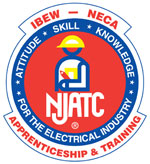We Operate a Nationally Recognized Joint Apprenticeship Program
 To ensure the ongoing availability of trained and qualified workers, we also operate a nationally recognized joint apprenticeship* program. The NECA-IBEW, together with the OJEATC and LEJATC, provide exceptionally trained professional electricians in commercial, low voltage and residential specialties to our local electrical contractors. A highly skilled workforce is vital to the growth and strength of the local electrical industry. In Nebraska, our apprentices complete nearly 1,000 classroom hours in this program and five years of on-the-job training. The training doesn’t stop there; every year our electricians complete additional coursework in new technologies, certification in specialty classes, safety practices and continuing education. Customers in Nebraska benefit and feel confident about our electricians’ competencies and quality work provided.
To ensure the ongoing availability of trained and qualified workers, we also operate a nationally recognized joint apprenticeship* program. The NECA-IBEW, together with the OJEATC and LEJATC, provide exceptionally trained professional electricians in commercial, low voltage and residential specialties to our local electrical contractors. A highly skilled workforce is vital to the growth and strength of the local electrical industry. In Nebraska, our apprentices complete nearly 1,000 classroom hours in this program and five years of on-the-job training. The training doesn’t stop there; every year our electricians complete additional coursework in new technologies, certification in specialty classes, safety practices and continuing education. Customers in Nebraska benefit and feel confident about our electricians’ competencies and quality work provided.
If you or someone you know would be interested in learning what it takes to be a skilled worker in the electrical field, contact: Greater Nebraska JATC, 2304 13th Street, Columbus, NE 68601; Phone: 402-563-2445.
Our Apprenticeship Program Includes:

1,000 Classroom Hours
We believe that a highly skilled workforce is vital to the growth and strength of the local electrical industry.

5 Years On-The-Job Training
Our training may include all areas of professional electrical specialization: commercial, low voltage and residential service.

Additional Coursework
Together NECA-IBEW and OJEATC offer a nationally recognized apprenticeship program to help produce the highest trained professional electricians in commercial, low voltage, and residential specialties.






